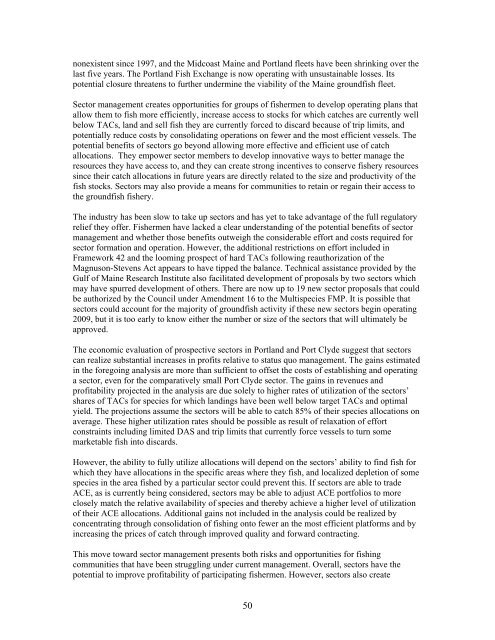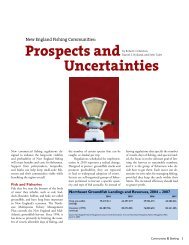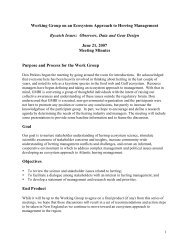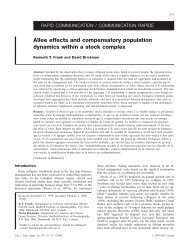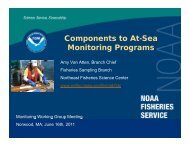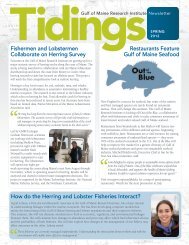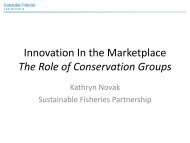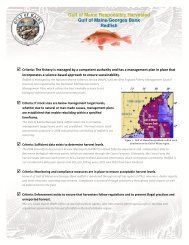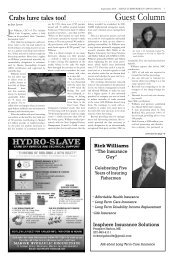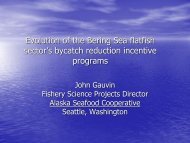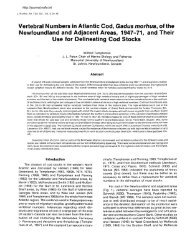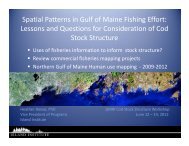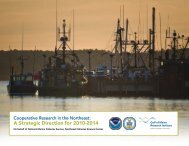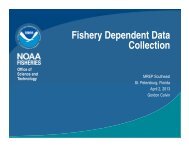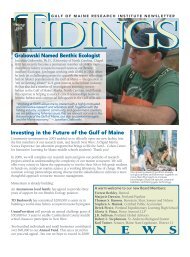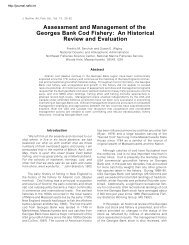Community-based Sectors for the New England Groundfish Fishery
Community-based Sectors for the New England Groundfish Fishery
Community-based Sectors for the New England Groundfish Fishery
Create successful ePaper yourself
Turn your PDF publications into a flip-book with our unique Google optimized e-Paper software.
nonexistent since 1997, and <strong>the</strong> Midcoast Maine and Portland fleets have been shrinking over <strong>the</strong><br />
last five years. The Portland Fish Exchange is now operating with unsustainable losses. Its<br />
potential closure threatens to fur<strong>the</strong>r undermine <strong>the</strong> viability of <strong>the</strong> Maine groundfish fleet.<br />
Sector management creates opportunities <strong>for</strong> groups of fishermen to develop operating plans that<br />
allow <strong>the</strong>m to fish more efficiently, increase access to stocks <strong>for</strong> which catches are currently well<br />
below TACs, land and sell fish <strong>the</strong>y are currently <strong>for</strong>ced to discard because of trip limits, and<br />
potentially reduce costs by consolidating operations on fewer and <strong>the</strong> most efficient vessels. The<br />
potential benefits of sectors go beyond allowing more effective and efficient use of catch<br />
allocations. They empower sector members to develop innovative ways to better manage <strong>the</strong><br />
resources <strong>the</strong>y have access to, and <strong>the</strong>y can create strong incentives to conserve fishery resources<br />
since <strong>the</strong>ir catch allocations in future years are directly related to <strong>the</strong> size and productivity of <strong>the</strong><br />
fish stocks. <strong>Sectors</strong> may also provide a means <strong>for</strong> communities to retain or regain <strong>the</strong>ir access to<br />
<strong>the</strong> groundfish fishery.<br />
The industry has been slow to take up sectors and has yet to take advantage of <strong>the</strong> full regulatory<br />
relief <strong>the</strong>y offer. Fishermen have lacked a clear understanding of <strong>the</strong> potential benefits of sector<br />
management and whe<strong>the</strong>r those benefits outweigh <strong>the</strong> considerable ef<strong>for</strong>t and costs required <strong>for</strong><br />
sector <strong>for</strong>mation and operation. However, <strong>the</strong> additional restrictions on ef<strong>for</strong>t included in<br />
Framework 42 and <strong>the</strong> looming prospect of hard TACs following reauthorization of <strong>the</strong><br />
Magnuson-Stevens Act appears to have tipped <strong>the</strong> balance. Technical assistance provided by <strong>the</strong><br />
Gulf of Maine Research Institute also facilitated development of proposals by two sectors which<br />
may have spurred development of o<strong>the</strong>rs. There are now up to 19 new sector proposals that could<br />
be authorized by <strong>the</strong> Council under Amendment 16 to <strong>the</strong> Multispecies FMP. It is possible that<br />
sectors could account <strong>for</strong> <strong>the</strong> majority of groundfish activity if <strong>the</strong>se new sectors begin operating<br />
2009, but it is too early to know ei<strong>the</strong>r <strong>the</strong> number or size of <strong>the</strong> sectors that will ultimately be<br />
approved.<br />
The economic evaluation of prospective sectors in Portland and Port Clyde suggest that sectors<br />
can realize substantial increases in profits relative to status quo management. The gains estimated<br />
in <strong>the</strong> <strong>for</strong>egoing analysis are more than sufficient to offset <strong>the</strong> costs of establishing and operating<br />
a sector, even <strong>for</strong> <strong>the</strong> comparatively small Port Clyde sector. The gains in revenues and<br />
profitability projected in <strong>the</strong> analysis are due solely to higher rates of utilization of <strong>the</strong> sectors’<br />
shares of TACs <strong>for</strong> species <strong>for</strong> which landings have been well below target TACs and optimal<br />
yield. The projections assume <strong>the</strong> sectors will be able to catch 85% of <strong>the</strong>ir species allocations on<br />
average. These higher utilization rates should be possible as result of relaxation of ef<strong>for</strong>t<br />
constraints including limited DAS and trip limits that currently <strong>for</strong>ce vessels to turn some<br />
marketable fish into discards.<br />
However, <strong>the</strong> ability to fully utilize allocations will depend on <strong>the</strong> sectors’ ability to find fish <strong>for</strong><br />
which <strong>the</strong>y have allocations in <strong>the</strong> specific areas where <strong>the</strong>y fish, and localized depletion of some<br />
species in <strong>the</strong> area fished by a particular sector could prevent this. If sectors are able to trade<br />
ACE, as is currently being considered, sectors may be able to adjust ACE portfolios to more<br />
closely match <strong>the</strong> relative availability of species and <strong>the</strong>reby achieve a higher level of utilization<br />
of <strong>the</strong>ir ACE allocations. Additional gains not included in <strong>the</strong> analysis could be realized by<br />
concentrating through consolidation of fishing onto fewer an <strong>the</strong> most efficient plat<strong>for</strong>ms and by<br />
increasing <strong>the</strong> prices of catch through improved quality and <strong>for</strong>ward contracting.<br />
This move toward sector management presents both risks and opportunities <strong>for</strong> fishing<br />
communities that have been struggling under current management. Overall, sectors have <strong>the</strong><br />
potential to improve profitability of participating fishermen. However, sectors also create<br />
50


